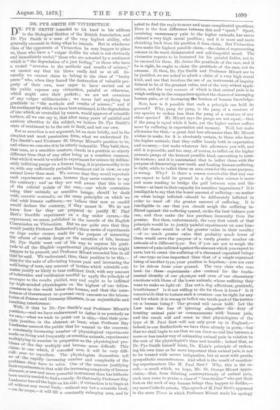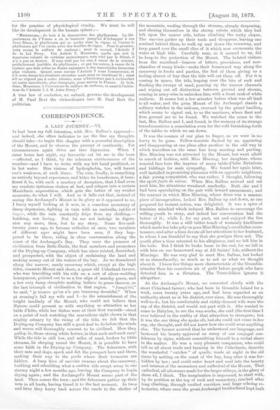DR. PYE SMITH ON VIVISECTION.
flR: PYIt- SMITH intended to hit hard in his address to the Biological Section of the British Association, and Dr. Pye Smith in a man of the very highest ability, who generally succeeds in doing What he intends. But in whichever class of the opponents of Vivisection he may happen to place us, those who have a "vulgar dislike for what is not obviously and immediately useful," those who are actuated by a sentiment which is "the degradation of 'a just feeling," or those who have a rooted "aversion to the methods and results of science," we cannot say that his blows really find us at all. As- suredly we cannot claim to belong to the class of "booby peers" who, when they feared the destruction of valuable pro- perty of their own, were eager to have carried out at the public expense any vivisection, painful or otherwise, which might save their pockets ; we are not conscious of' any vulgar utilitarianism ; we never feel anything but gratitude to "the methods and results of science ;" and if the sentiment -by which we have been animated, is the degradation of one which; as controlled by reason, would approve of scientific torture, all we can say is, that after many years of painful and anxious attention to the subject, we believe Dr. Pye Smith's state of sentiment to be the one in fault, and not our own.
But as assertion is not argument, let us state briefly, and in the simplest and must passionless form, what we understand Dr. Pye Smith's and Professor St. George Mivart's position to be, and where we conceive it to be utterly untenable. They hold, then, that man, as a sensitive creature, stands in a position so utterly different from that of any other being as a sensitive creature, that while it would be wicked to experiment for science by deliber- ately inflicting pangs on a human being, it is praiseworthy to do so, with any snfficiently probable beneficent -end in view, on any animal lower than man. We assume that they would reprobate such experiments on man, because they never venture to say the contrary; and as they are• well aware that this is one of -the critical points of the case,—our whole contention being that animals, as sentitive beings, should' be dealt mutatis matandis, on the same principles on which we deal with- htirria,n- sufferers,—vre believe that- men so candid would declare the contrary, if they meant it. We do not know how far they are prePared to justift, M Ptinl Bert's horrible experiment' on a dOg under curare,--the experiment, we mean, published in the records of the EngliSh Commission on Vivisection. Brit 'we are quite sure that they would justify Professor Rutherford's three series of experiments on dogs under curare, made for the purpose of measuring the effects of certain drugs on the secretion of bile, because Dr. Pye' Smith' went out of his way to express his grati- tude to all the English experimental physiologists who might liniment° in present, and Professor Mivart 'seconded him in all that he 'said. We understand, then, their position to be this,— that for the Bake of alleviating human pain and increasing the tvell-beinw of man, any amount of torture -which scientific esti- mates- justify as likely to bear sufficient fruit, with any amount of reiteration and verification needful to apply the principle of averages to the results yielded, may and ought to be inflicted by high-minded- physiologists on the highest of our fellow- creatm-es in the world below the human, and that the inter- ference' of Government to prevent such excesses as the labora- tories of Prance and Germany- illustrate, is an unjustifiable and insulting interference. Well, if that be Dr. Pye Smith's and Professor- Mivart'S Position,—and we have endeavoured' to define it as precisely as We cau,—what we wish to point out is this,—that their prin- ciple justifies, in the abstract at least, what Professor Ray Lankester assured the public that he wanted in the concrete, a constantly increasing number of physiological experiments made on living and frequently on sensitive animals, experiments multiplying in number in proportion as the physiological pro. blems of the day multiply and become more difficult. This claim is one which, if conceded now, it will be very diffi- cultever to repudiate. The physiologists themselves tell as of the rapidly increasing number and complexity of the problems they have to solve. One of the reasons justifying their e xPoriments is that with the increasing complexity of human diseases, a new and more powerful instrument than has hitherto been used is needed to find a remedy. So that really Professor Ray Lankester has all the ogle on his side ; if vivisection is to begin at all without any moral limit,—without any but a scientific limit, on its scope,—it will fill a constantly enlarging area, and be asked to flnd the -reply to more and more complicated questions. Here is the first difference between this and "sport." Sport, involving unnee,easary pain to the higher animals, haa never claimed a very high moral position ; and it is more and more shrinking back from the position it does claim. But Vivisection does make the highest possible claim,---the claim of representing science in its most disinterested and self-forgetful mood-. The vivisector expects to be honoured for his painful duties, not to be excused for them. He claims the gratitude of the race, and if he is right, he ought to claim the gratitude of the race, not its °souses. If, then, Dr. Pye Smith and Professor Mivart are to be justified, we are asked to admit a claim of a very high moral kind, and one that involves the use of an instrument of iuquiry dehtred to be of the greatest value, and of the very widest appli- cation, and the very essence of which is that animal pain is to weigh nothing in the comparison against the chance of assuaging human pain, or of increasing time horizon of human knowledge.
Now, how is it possible that such a principle can hold its ground ? Why, pang for pang, is the pang of a creature of one species to reckon less than the pang of a creature of any other species P Mr. Mivart says the pangs are not equal,—that if the pang is equal while it lasts, yet the higher nature suffers more by suffering in expectation and memory. Well, but make allowance for that,—a great deal loss allowance than Mr. Mivart wishes to make, for it is absolutely certain, to those who know the higher animals, that they suffer keenly both in expectation and ,meniery,—but make whatever fair allowance you will, and still it is possible, and too easy, of course, to inflict on the higher animals pangs of the keenest possible kind, amounting to terri- ble torture ; and it is maintained that to inflict them with the purpose a discovering nenntruth and healing human., suffering, is right, while to inflict them' on men, even for the same purpose, is wrong, Why P Is there a reason conceivable that any one can expect to hold its ground in a day when science is more and more tending to bridge the gulf between man and the brutes—at least in their capacity for sensitive impressions ? It is intelligible to say that the lesser amount of suffering—no matter on whet beings inflicted—should be deliberately inflicted in order to ward off the greater amount of suffering. It is intelligiblo to say that you should weigh the suffering in Meted against, the suffering spared,' strike the best balance you can, and then make the less purchase immunity from the greater. But then, unfortunately, the very first result of that principle would be to justify painful experiments on man him. self, for these would be of far greater value in their results; —of so much greater value that probably much fewer of them would serve the'purpose of a vastly greater number on animals of a different type. But if you are not to weigh the amount of paininflictei against the amount which you expect to KM{ but to count the- suffering of a thonsahd organised beings of one typo as less important than that of a single organised being of another type; your petition is hopeless,—you are sure to be driven from your ground. The very class who con- tend for these,- experiments , alto contend for the funds- mental identity of our physique and oven of our elementary emotions with those of the lower animals, whose suffering they want to make so light of. Has not 'a dog affections, gratitude, trustfulness ? Is it not willing to die for those it loves P Is it conceivable that to 'torture such a creature- can be right for any end for which it is wrong 'to inflict one tenth-part of 'the torture on a Iranian being P The ground will never hold. Let the Law take the line of ignoring altogether the duty of treating animal pain as commensurate with him-tan pain, and the result will and must be that physiologists of the type of M. Paul Bert will not only grow up in England,— indeed; in our Ratherfords we have them already in' germ,—'but that we shall begin to see that we can draw no real line between a more or less tendervray of estimating animal pain in relation to the cost of the physiologist's time and trouble ; indeed that, as Dr. Pye Smith himself hints, Dr. Klein's principle of reckon- ing his own time as far more important than animal pain, is not to be treated with severe indignation, but at most with gentle, sympathetic remonstrances. And what is the result of sanction- ing experimenters like M. Paul Bert? Why, this is the re- sult,—a result which, we hope, Mr. St. George Mivart a,ppre- ciates,—that, from thinking contemptuously of animal pain, such men come to praise a class of " insecticides " who put their foot on the neck of any human beings they happen to dislike,— say mereCatholic priests. This speech of M. Paul Bert's appeared in the same Times in which Professor Mivart made his apology
for the practice of physiological cruelty. We trust he will like its development in the human sphere
"Massxauss,—Je bois is destruction des phyllozoras. Le D6- partement de l'Yonne a en le bonheur jusqu ici d'echappor ces deux fl6aux, le phylloxera qui so cache sous la Tigne, et l'autre le phylloxera qui l'on cache area des feuilles de vigne. Pour lo premier, nous avons le sulfure de carbono ; pour le second, l'Article 7 de is Loi Fem. Oct Article 7, Messieurs, quelle quo soit la mauvaise volont6 do oertains personnages, sera vote par in Senat, 11 n'y a pas on douter. Ii sera vote par los uns, cause de la °mint°, parfaiternont justifl6e, du phylloxera; et par les autres, it cause de Is crainte quo lour refus ne donne naissance it des insecticides beaucoup plus violents. Quand nous aurons l'Artiale 7 nous l'essayerons, et s il nous donne lea rOsultats attendus nous nous en tiendrons lit; maim
no r6pond pas it notro attonte, nous n'h6siterons pas it reolierohor nn autre insecticide, plus 6norgique, pour sauver Is Prance. Jo balm, don°, Messieurs, it l'inventeur du sulfur° de carbon°, et aussi hl'initia- tenr de l'Artiole 7, it M. Jules Ferry."
A true law of evolution, we submit, governs the development of M. Paul Bert the vivisectionist into M. Paul Bert the































 Previous page
Previous page